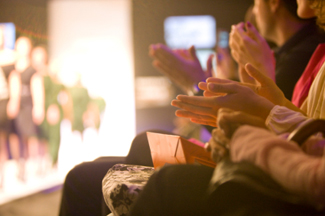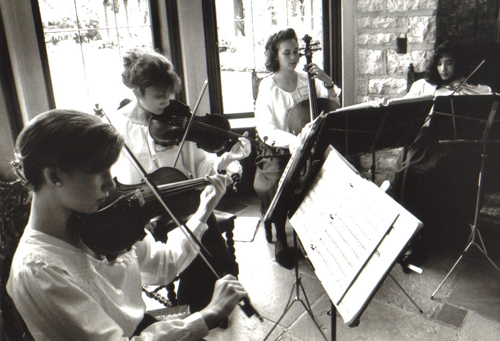Mind the Gap: December 2009 Archives
So, I know I got a little "Bah! Humbug!"-y on the ol' Christmas tunes last week. I admit that memories of suburban shopping frenzies and endless cocktail parties have turned me a bit dark when it comes to the holiday classics. But the internet being, well, the internet, a few gems turned up to make me change my (yes, I'm going there) tune. (The holiday punch helped also.)
First, the talented and adorable Pomplamoose bring us this warm and fuzzy (and non-denominational!! and good cause $$ generating!!) tune "Always in the Season."
The real ear-opening experience, however--aside from the Christmas song about the hippopotamus (?!?!) at least--came with Ted Hearne's arrangement of "Have Yourself a Merry Little Christmas." Somehow, I must not have been paying close enough attention these past 30 years. It took Ted's arresting sonic manipulations to rouse me from my sugar-induced cookie stupor and wake me up to what this song was actually supposed to be about. When you're ready to leave behind the saccharinely sanitized "let your heart be light" lyrical rewrite, go and listen to Ted's take on the original version here.
 If the NEA's 2008 Survey of Public Participation in the Arts and the roundtable discussion that accompanied its release last week are the kind of thing that floats your boat, I tossed my two cents into that pond here.
If the NEA's 2008 Survey of Public Participation in the Arts and the roundtable discussion that accompanied its release last week are the kind of thing that floats your boat, I tossed my two cents into that pond here.
Aside from the clear need for a reassessment of the parameters we use when surveying American adults about their arts experiences (i.e. what counts as art in these times of dissolving definitions/genre hierarchies), the big, future-looking question the survey left me with was this: With all we have seen in the evolution of communications technology, is it possible that a trend of cultural participation will actually be seen and strengthened as audiences transition from a position of passive consumption to one of active and engaged parallel creation?
 Last night there was some seriously joyous (if wordless) caroling here in Baltimore.
Last night there was some seriously joyous (if wordless) caroling here in Baltimore.
Then, on waking late to grey and drizzly skies, the latke-making got the kibosh put on it in favor of some simple eggs and toast (interestingly the New York Times' "oatmeal buttermilk blueberry pancake" recipe was running a brisk distribution as the "most emailed article". Guess we were all looking for some form of cozy Sunday morning comfort). A little while later, however, we did get into the non-denominational seasonal spirit with a little cookie baking (I swear even my hair now smells of chocolate). This was accompanied by the obligatory downloading/endless looping of Vince Guaraldi's soundtrack to A Charlie Brown Christmas.
Which led me back tonight to Drew's challenge to lay out the best and worst in holiday music. I hate to be a Scrooge about it, but as I was musing earlier, aural memories can carry a lot of buried information, and for me these familiar refrains conjure mostly shopping malls and stress.
More than anything, however, the ten basic tunes of carolers everywhere call to mind those endless holiday party quartet gigs we played for gas money in high school. These interminable events effectively stamped out any joy the music may have once inspired in me. Every medley had a "Hark the Herald Angels Sing" transition and a stinger of false excitement for an ending. From time to time, a guest enjoying some serious holiday cheer would hand me her glass and request a refill. I don't blame her. "Jingle Bells," played in ten different international "styles," would inspire anyone to indulge in extra eggnog.
So I don't know about you, but while I find a lot of joy in the season--in old traditions and in new--it's not usually a classic holiday song that triggers a desire to deck the halls.

 After watching this video for Flypt, an iPhone app that let's users remix music using some basic effects, I got to thinking again about the new ways these and other programs are bringing musical creativity into people's lives. No, it's not necessarily the equivalent of learning to play the cello, but it's flexing muscles in people that I assume most music professionals appreciate seeing toned. Doesn't the future of music seem brighter when playing music isn't simply turning on the radio but actually thinking about the process of making sound? In some ways, it seems like a return the engagement experienced when lots of people played an instrument "a little" to meet family/community demands, but with the added bonus that professional music is also all around us.
After watching this video for Flypt, an iPhone app that let's users remix music using some basic effects, I got to thinking again about the new ways these and other programs are bringing musical creativity into people's lives. No, it's not necessarily the equivalent of learning to play the cello, but it's flexing muscles in people that I assume most music professionals appreciate seeing toned. Doesn't the future of music seem brighter when playing music isn't simply turning on the radio but actually thinking about the process of making sound? In some ways, it seems like a return the engagement experienced when lots of people played an instrument "a little" to meet family/community demands, but with the added bonus that professional music is also all around us.
It also brought to mind once again Lessig's book (and our conversation on MTG) covering the role of remixing in contemporary culture. From simple linking to complete overhauls of message, the way we are digesting information and trading ideas is exploding off the screen. I admit I worry it's all flying at me so fast that I'm missing a great deal of the actual content and only catching 25% of any particular thought. Is my mind truly benefiting or is it slowly crawling deeper and deeper into a hole due to idea shell shock? Maybe perpetual stimulation is not to be feared, but adjusting to this kind of high-speed collective processing is exhausting (good thing I didn't go to Oberlin, then, I guess). In the end, I know I'm jumping the gun, because we're still playing with these new tools/toys--twisting and pulling on them to see not just what new technologies can do, but what we can do and become alongside them. Maybe that process will never end, but how profoundly will it end up altering the way we think about, well, everything?
UPDATE: Information Overload: Americans Consume 34 GB of Data Daily
There's been quite a bit of chatter out there in response to Brian Eno's assertion in Prospect magazine that "the idea that something is uncool because it's old or foreign has left the collective consciousness." Is he out of touch with reality or is he the indisputable cool person saying we are all cool now?
Oh, wait, wait, no. Not all. Seems classical music didn't jump onto this train to popularity:
There are just too many styles around, and they keep mutating too fast to assume that kind of dominance. As an example, go into a record shop and look at the dividers used to separate music into different categories. There used to be about a dozen: rock, jazz, ethnic, and so on. Now there are almost as many dividers as there are records, and they keep proliferating. The category I had a hand in starting--ambient music--has split into a host of subcategories called things like "black ambient," "ambient dub," "ambient industrial," "organic ambient" and 20 others last time I looked. A similar bifurcation has been happening in every other living musical genre (except for "classical" which remains, so far, simply "classical")
Ah, if only he knew of our nomenclature headaches! But seriously, whether he thinks classical missed the boat to this party or not, if Eno's core idea is mixed with a bit of Long Tail theory (death of the mainstream combines with the benefits of digital distribution) it seems to suggest that while new opportunities may not be as deep, the pool is now much, much wider. While your shot at a spot in the Philharmonic's clarinet section may have shrunk, you now have a chance at realizing your previously too far fetched dream of forming a successful bagpipe band.
Or at least I hoped that was where we might be headed. Then the realities of making money in the digital age smacked me on the forehead. Ouch.
Blogroll
AJ Ads
AJ Blogs
AJBlogCentral | rssculture
Terry Teachout on the arts in New York City
Andrew Taylor on the business of arts & culture
rock culture approximately
Laura Collins-Hughes on arts, culture and coverage
Richard Kessler on arts education
Douglas McLennan's blog
Dalouge Smith advocates for the Arts
Art from the American Outback
For immediate release: the arts are marketable
No genre is the new genre
David Jays on theatre and dance
Paul Levy measures the Angles
Judith H. Dobrzynski on Culture
John Rockwell on the arts
Jan Herman - arts, media & culture with 'tude
dance
Apollinaire Scherr talks about dance
Tobi Tobias on dance et al...
jazz
Howard Mandel's freelance Urban Improvisation
Focus on New Orleans. Jazz and Other Sounds
Doug Ramsey on Jazz and other matters...
media
Jeff Weinstein's Cultural Mixology
Martha Bayles on Film...
classical music
Fresh ideas on building arts communities
Greg Sandow performs a book-in-progress
Harvey Sachs on music, and various digressions
Bruce Brubaker on all things Piano
Kyle Gann on music after the fact
Greg Sandow on the future of Classical Music
Norman Lebrecht on Shifting Sound Worlds
Joe Horowitz on music
publishing
Jerome Weeks on Books
Scott McLemee on books, ideas & trash-culture ephemera
theatre
Wendy Rosenfield: covering drama, onstage and off
Chloe Veltman on how culture will save the world
visual
Public Art, Public Space
Regina Hackett takes her Art To Go
John Perreault's art diary
Lee Rosenbaum's Cultural Commentary
Tyler Green's modern & contemporary art blog
